Best Tabbouleh
Learn how to make delicious, authentic tabbouleh at home! This tabbouleh (also spelled tabouli) is even better than your favorite Lebanese restaurant's.
Updated by Kathryne Taylor on August 30, 2024
501Comments
Jump to recipeFinally! I’ve figured out how to make the best tabbouleh. It’s just as good, if not better than, my favorite local Middle Eastern restaurant’s. If you try it, I think you’ll agree.
Tabbouleh (also spelled tabouli) is a super fresh herb and bulgur salad, with parsley being the number one ingredient. It’s dotted with diced cucumber and tomato, and dressed simply with olive oil and lemon juice. It’s refreshing, light and packed with healthy ingredients.
You’ll often find tabbouleh as a side dish on Mediterranean menus. It’s right at home with hummus, baba ganoush, falafel, feta, olives… all of my favorite things.
I’ve attempted tabbouleh at home over the years, and I’m so pleased to share what I’ve learned with you today. Ready to make some great tabbouleh?
Tabbouleh Ingredients
Bulgur
Bulgur is parboiled cracked wheat, so it’s a whole grain. Once prepared, it’s tender and fluffy. Bulgur is often confused with couscous, but they’re not the same (couscous is actually tiny pasta).
Authentic tabbouleh is made with super fine grain (#1) bulgur and it’s soaked rather than cooked, but I haven’t been able to find it at regular grocery stores. There are several other varieties of bulgurs, and you’ll probably find only one option at the store. So, cook (or soak) it according to the package directions.
Fresh Parsley
Authentic tabbouli uses a ton of parsley. That’s why this salad is so green! I tried both flat-leaf and curly, and for once, curly is the way to go. Even when it’s chopped very small, curly parsley offers some extra volume that makes this tabbouleh so pleasant to eat.
Fresh Mint and Green Onion
Mint is standard and adds even more fresh flavor. That said, it can be expensive if you don’t grow it at home, so you can skip it if you’d rather.
Green onion is my mild onion of choice. It’s perfect in tabbouleh.
Cucumber and Tomato
Fresh cucumber and tomato add more texture and color, and build on the refreshing factor. Have I said refreshing enough yet?
Lebanese readers have informed me that cucumber is unusual in tabbouleh, which is news to me! You can skip it if you’d like, but it’s quite nice.
Olive Oil, Lemon Juice and Garlic
Tabbouleh is dressed in a simple combination of olive oil and lemon juice. You won’t find garlic in every tabbouleh recipe, but I think that one clove makes this recipe extra delicious.
How to Make the Best Tabbouleh
1) Salt your tomato and cucumber, and drain off the excess juice.
Fortunately, this doesn’t take any extra time. Tomato and cucumber release a lot of moisture when they’re exposed to salt, and will make your tabbouleh way too watery if you do not drain it off.
Simply combine the tomato and cucumber in a bowl with some salt (you’ll find these instructions in the recipe below), and set it aside while you chop the parsley. Drain off the excess juice before you stir the salad together. Easy!
2) Use lots of parsley and chop it finely.
This recipe calls for three bunches of parsley, and the easiest way to chop that much parsley is in your food processor. You can do it by hand, but it will take a while. Don’t worry about removing the thin parsley stems—they offer a lot of great flavor.
3) Season sufficiently with lemon juice and salt.
Tabbouleh should be zingy and full of flavor, and you’ll need to use enough lemon and salt to get there.
Watch How to Make Tabbouleh
Tabbouleh Serving Suggestions
Tabbouleh is typically served chilled or at room temperature. It’s a perfect side dish or salad to offer with Mediterranean/Middle Eastern meals. Here are a few suggestions:
- Dips and spreads: Creamy Hummus, Baba Ganoush, Tzatziki, Tahini Sauce
- Crispy Baked Falafel
- Fattoush Salad with Mint Dressing
- Mujaddara (Lentils and Rice with Caramelized Onions)
- Dukkah with bread and olive oil
Please let me know how your tabbouleh turns out in the comments! I hope you love it.
Best Tabbouleh
Learn how to make delicious, authentic tabbouleh at home! This tabbouleh (also spelled tabouli) is even better than your favorite Lebanese restaurant’s. Recipe yields 6 servings (a little over 1 cup each).
Ingredients
- ½ cup bulgur
- 1 cup diced cucumber (1 small-to-medium)
- 1 cup diced tomato* (1 large)
- 1 teaspoon fine salt, divided
- 3 medium bunches curly parsley
- ⅓ cup (⅔ ounce) chopped fresh mint (optional but recommended—you can chop it in the food processor with the parsley)
- ⅓ cup thinly sliced green onion
- ⅓ cup extra-virgin olive oil
- 3 to 4 tablespoons lemon juice, to taste
- 1 medium clove garlic, pressed or minced
Instructions
- Cook or soak the bulgur until tender according to package directions. Drain off any excess water, and set aside to cool.
- Meanwhile, combine the diced cucumber and tomato in a medium bowl with ½ teaspoon of the salt. Stir, and let the mixture rest for at least 10 minutes or until you’re ready to mix the salad.
- To prepare the parsley, cut off the thick stems. Then, finely chop the parsley and remaining stems—you can do this by hand, but it’s much easier in a food processor with the standard “S” blade. Process 1 bunch at a time (each should yield about 1 cup chopped), transferring the chopped parsley to a large serving bowl before proceeding with the next.
- Add the cooled bulgur, chopped fresh mint (if using) and green onion to the bowl of parsley. Strain off and discard the cucumber and tomato juice that has accumulated in the bottom of the bowl (this ensures that your tabbouleh isn’t too watery). Add the strained cucumber and tomato to the bowl.
- In a small measuring cup or bowl, whisk together the olive oil, 3 tablespoons lemon juice, garlic, and remaining ½ teaspoon salt. Pour it into the salad and stir to combine. Taste, and adjust if necessary—add another tablespoon of lemon juice for zing, or salt for more overall flavor.
- If you have the time, let the salad rest for 15 minutes before serving to let the flavors mingle. Otherwise, you can serve it immediately or chill it for later. Tabbouleh will keep well in the refrigerator, covered, for up to 4 days.
Notes
Make it gluten free: Bulgur is not gluten free (it’s cracked wheat). Substitute quinoa for an untraditional gluten-free option. You’ll use the same amount (½ cup) uncooked quinoa, or 1 ½ cups cooked leftover quinoa. Here’s how to cook quinoa.
*Tomato note: Use the most ripe and red tomatoes you can find! If you’re making this salad when tomatoes aren’t in season, cherry tomatoes might be your best bet.
Nutrition
The information shown is an estimate provided by an online nutrition calculator. It should not be considered a substitute for a professional nutritionist’s advice. See our full nutrition disclosure here.

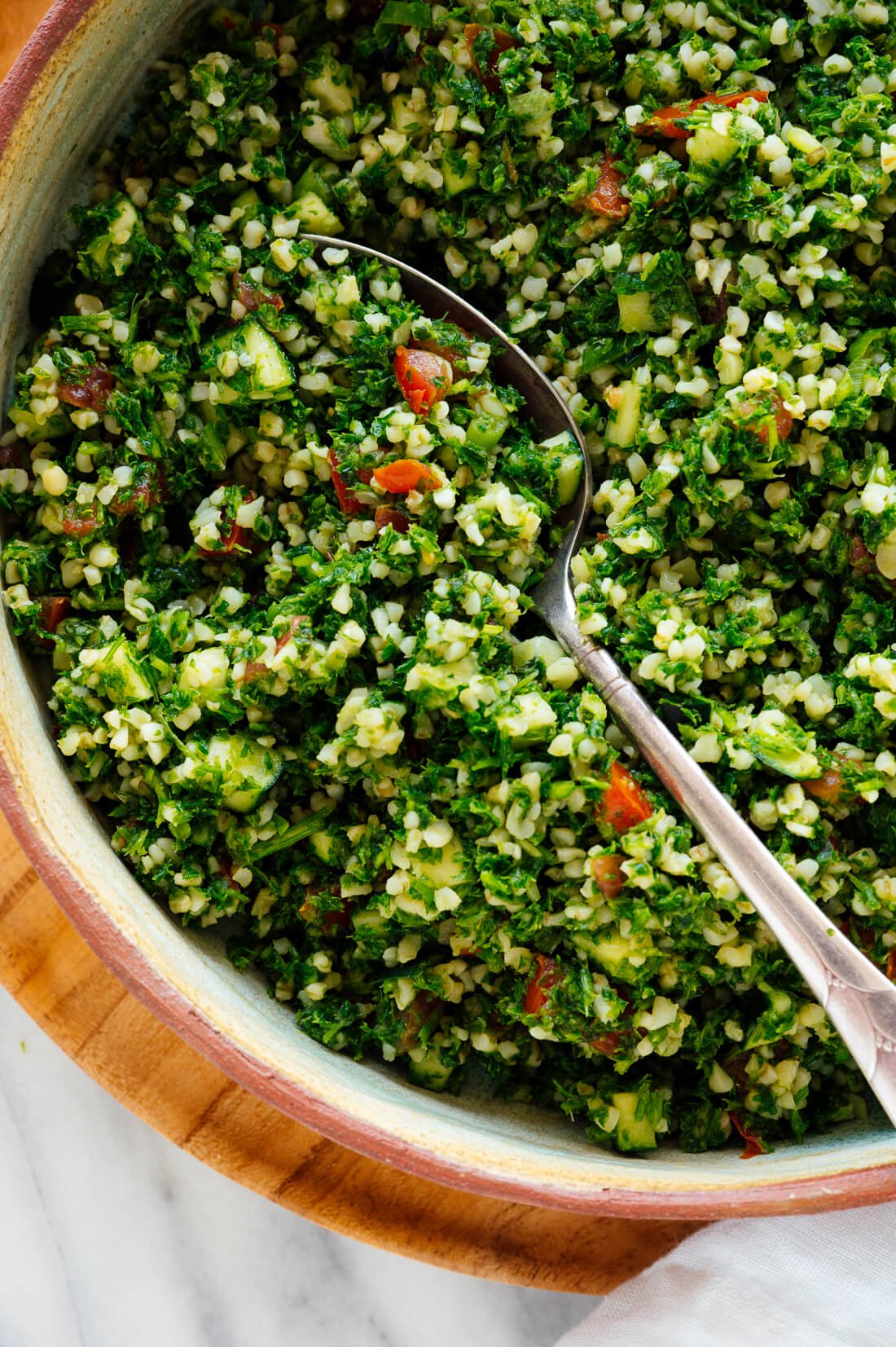
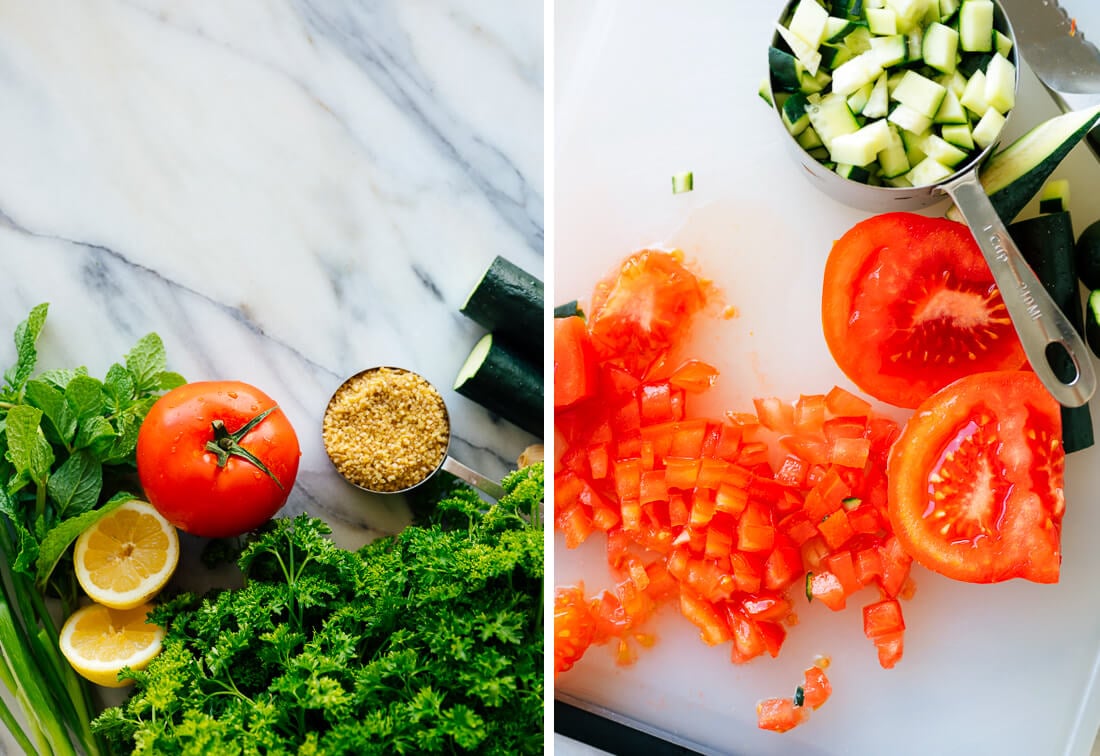
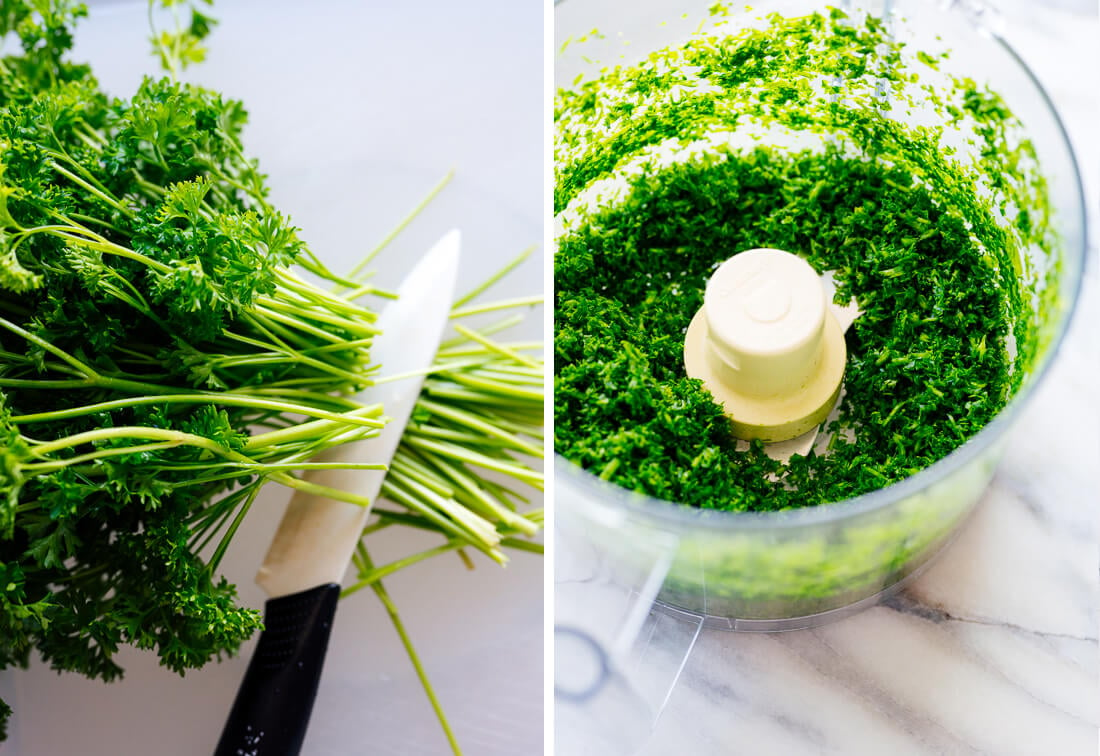
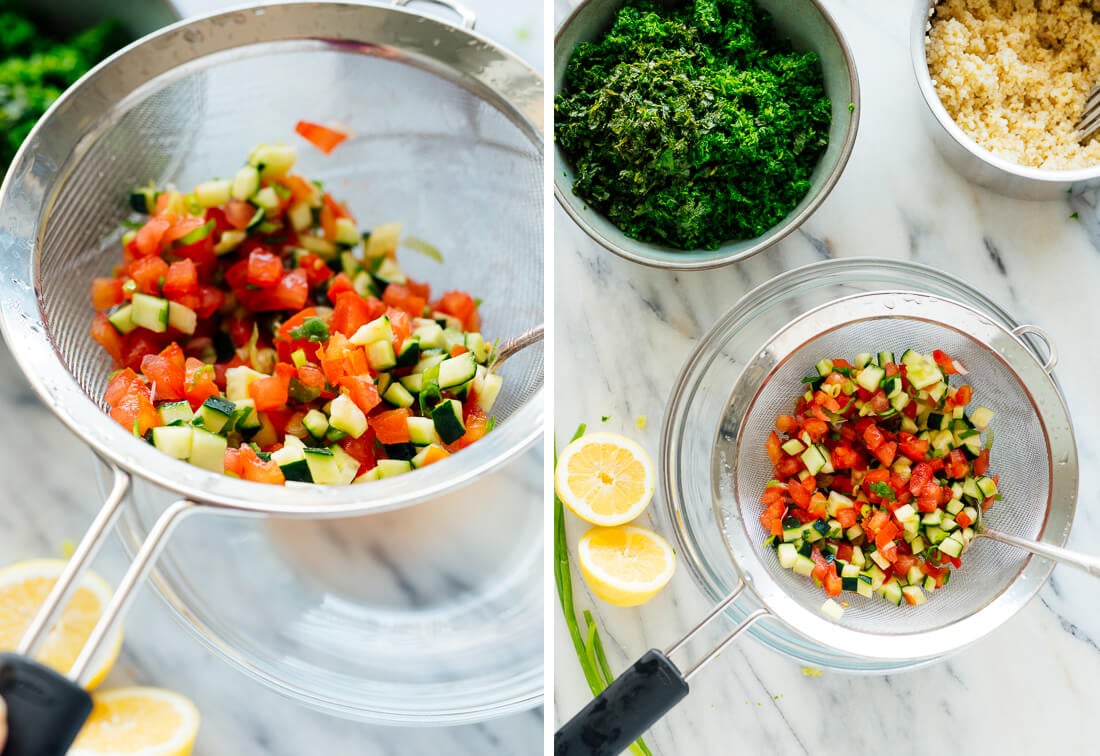
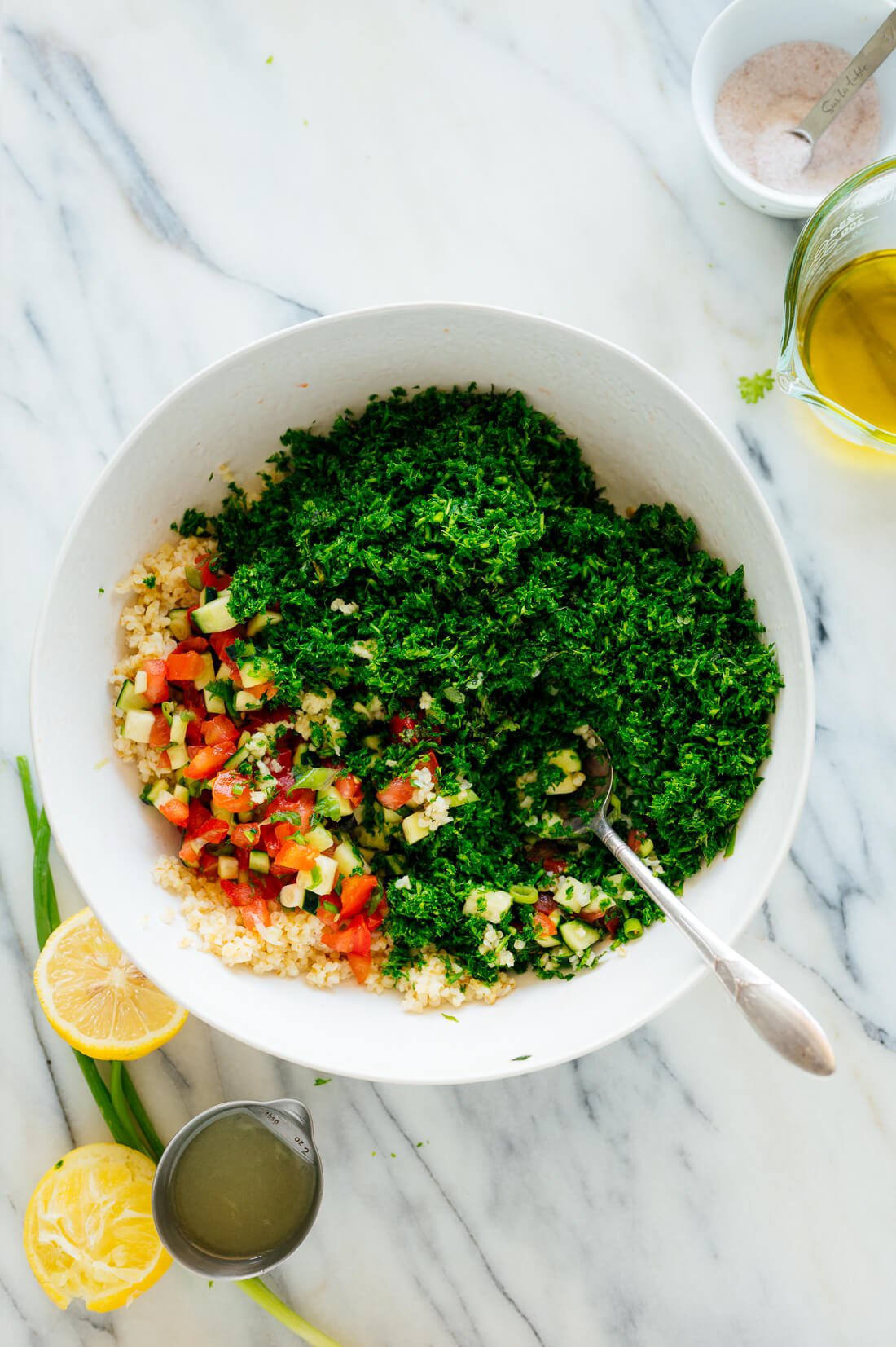
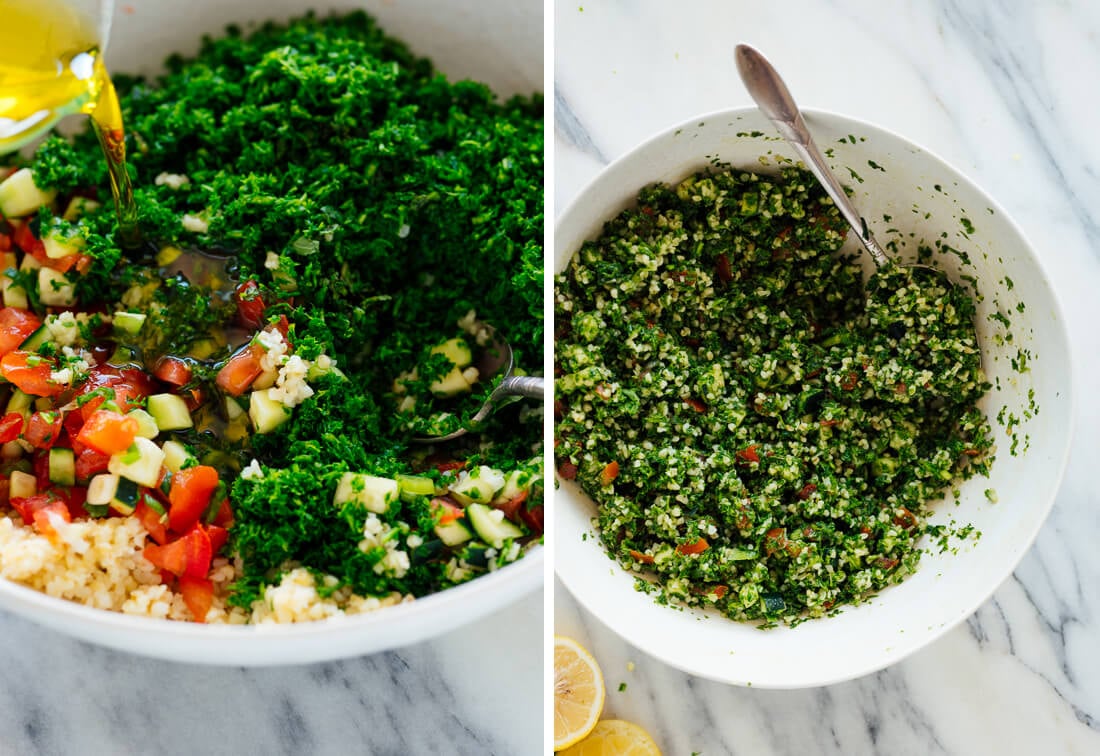
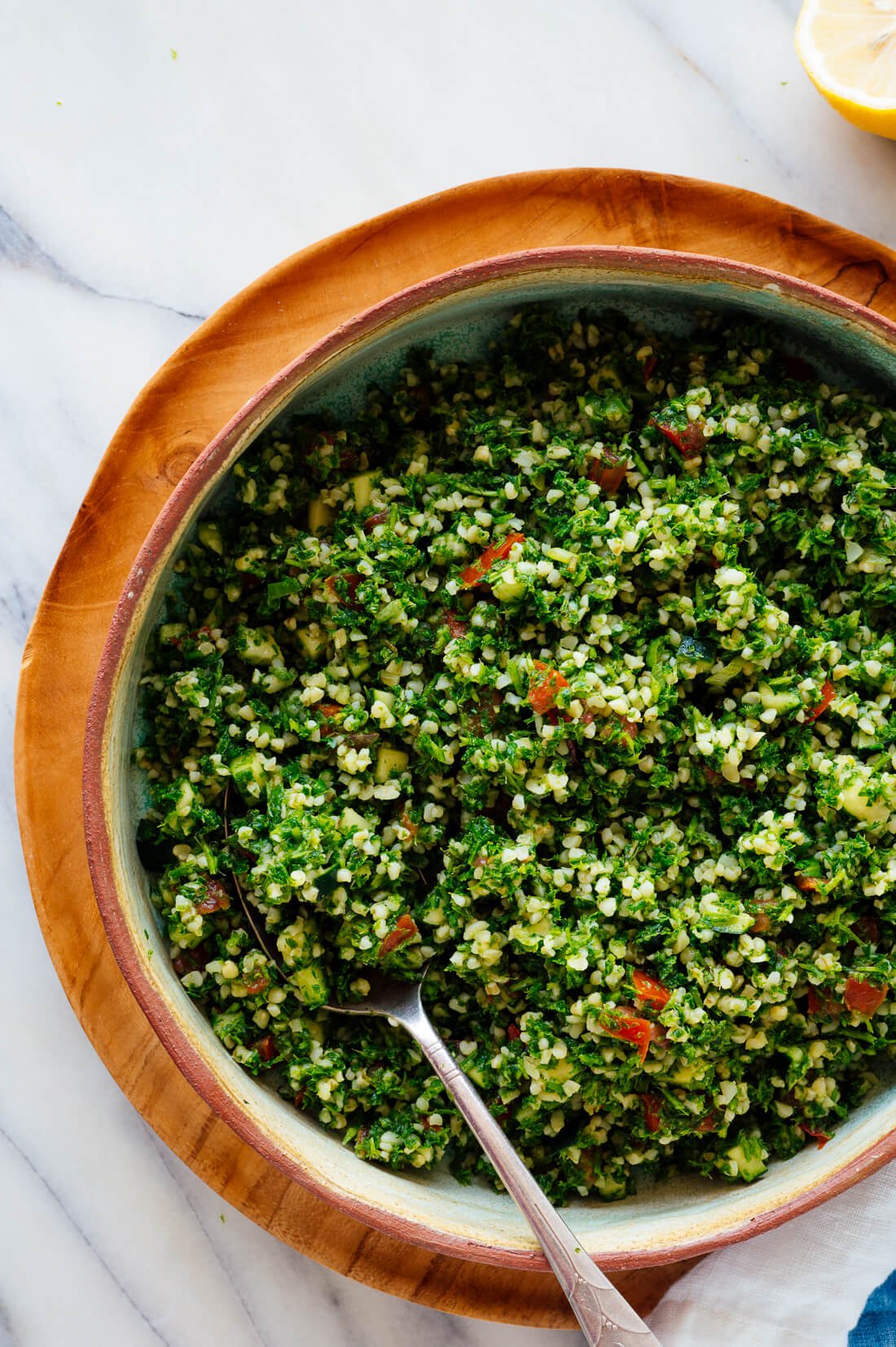
















The IS the best. Is it because of all the fresh ingredients? Is it because of my garden tomatoes? Is it because I made it?
YES. YES. YES. And it’s sooo refreshing
I’m excited you loved it, Karla! I appreciate your review.
This tabbouleh recipe is top notch. The bulgur I had was coarse but I think I preferred the extra “meatiness” it provided. Thanks for the recipe, will definitely be making it again.
You’re welcome, Gary!